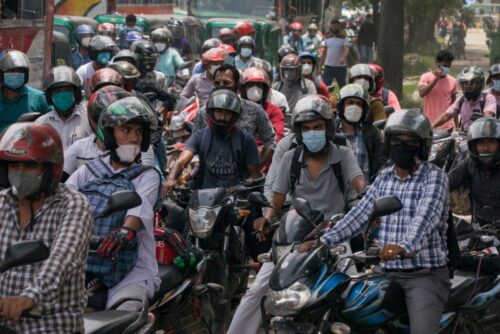

A Temporary Basic Income Could Curb Coronavirus in Poor Nations, U.N. Says
 Upper- advanced
Upper- advanced
2020/08/20 15:00
1. threshold ( n)
the level or point at which you start to experience something, or at which something starts to happen
2. debt (n)
something, especially money, that is owed to someone else, or the state of owing something
3. unprecedented (adj)
never having happened or existed in the past
4. afloat (adj)
having enough money to pay what you owe and not have debts
5. subsidies (n)
money given as part of the cost of something, to help or encourage it to happen
6. stem (v)
to stop something unwanted from spreading or increasing
7. curb (v)
to control or limit something that is not wanted
8. handout (n)
a document given to students or reporters that contains information about a particular subject
A Temporary Basic Income Could Curb Coronavirus in Poor Nations, U.N. Says

Temporary basic income payments could stem the spread of the coronavirus pandemic by allowing the world’s poorest people to stay at home, according to a new report from the United Nations Development Programme.
A six-month guaranteed handout for 2.7 billion living below or just above the poverty line in 132 developing countries would cost around $199 billion per month. Russia, for example, could lift 48 million people to the country’s “vulnerability threshold” for $5.3 billion per month — roughly 0.12% of GDP. India would need $18.4 billion to do the same for 658 million people.
Money for such efforts could come from a variety of sources, the agency said, including the reallocation of external debt service payments.
The Group of 20 leading economies has offered a Debt Service Suspension Initiative to the world’s poorest nations that runs through December. So far, 42 countries have requested help under the plan, and $5.3 billion in repayments has been suspended.
“Unprecedented times call for unprecedented social and economic measures,” Achim Steiner, the UNDP’s administrator said in a statement. “A temporary basic income might enable governments to give people in lockdown a financial lifeline, inject cash back into local economies to help keep small businesses afloat, and slow the devastating spread of Covid-19.”
The plan would require 12% of the expected total financial response to pandemic in 2020, which is equivalent to one-third of what developing countries owe in external debt payments this year, the UNDP said.
The program could also be funded by energy subsidies, after a decline in oil prices, and through emergency cash transfers.
It is particularly necessary in developing nations, where nine out of ten workers have informal employment and can’t earn money if they are at home, the agency said.
Resource: https://time.com/5870438/basic-income-payments-coronavirus-u-n/

- How many countries would the basic income help?
- Who did the article say were hardest hit by the pandemic?
“These so-called bleak times are necessary to go through in order to get to a much, much better place.”
David Lynch


